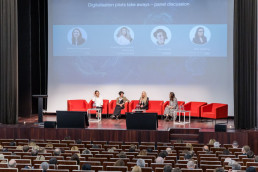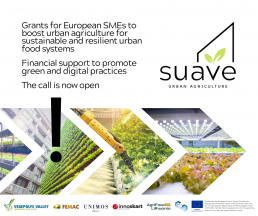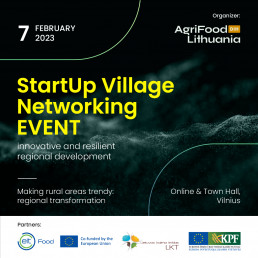EDIH Network Annual Summit Highlights Collaboration for SME Digital Transformation
The first Annual European Digital Innovation Hub (EDIH) Network Summit, held from May 31 to June 1 in Brussels, showcased the latest advancements in digital innovation and fostered collaboration among industry experts and stakeholders.
The Summit is the key European digital innovation event of the year and provides an important platform for knowledge sharing and community building within the EDIH network. The 2023 edition brought together over 300 EDIH representatives, policy makers and civil servants
The Summit featured various keynote speakers, panel discussions, working groups and networking opportunities. Working Group 2 ‘Supporting the Low Digitalised SMEs’ was dedicated to showcasing the findings of the Smart Industrial Remoting study, implemented by PPMI in collaboration with the European Commission.
The working group began with a welcome address from Dr. Heidi Cigan, Senior Policy Officer at DG CNECT, who outlined the study's context and objectives. Following the welcome, Rūta Gabaliņa, Senior Researcher at PPMI, presented the key findings from the digitalisation pilots conducted as part of the study. Rūta shared valuable insights and practical tips for EDIHs on effectively collaborating with SMEs and companies of low digital maturity.
The panel discussion that followed, moderated by Barbora Kudzmanaite, Research Manager at PPMI, featured distinguished speakers including Kristina Šermukšnytė-Alešiūnienė, Director of Agrifood Lithuania, and Anca Sandu, Managing Partner of UnitH2B.
The panelists shared their experiences, success stories, and insights, highlighting the importance of strong partnerships between hubs and SMEs. Key takeaways included the significance of trust building, finding common ground, and showcasing the value of digitalization to establish lasting collaborations.
As Kristina Šermukšnytė-Alešiūnienė has noticed in the discussion, it’s not easy to convince low digitalization SME’s to take a try and see the extra value. EDIHs make outstanding work in changing minds in management and creating networks that work. Being in the innovation community provides the support and inspiration to carry on ensuring sustainable and competitive business. The collaboration between EDIHs and SMEs empowers boths sides to create value together.
The EDIH network plays a crucial role in driving the digital transformation of European businesses. It aligns with the EU's Digital Decade 2030 targets, focusing on accelerating the adoption of advanced digital technologies, supporting the growth of EU unicorns, and ensuring a basic level of digital maturity for SMEs.
The presentation of the Smart Industrial Remoting study at the EDIH Network Annual Summit not only raised awareness of its findings but also emphasized the critical importance of SME digitalization. As the study approaches its final stages, the upcoming milestone involves the development of a Digitalization Toolbox, a valuable resource providing practical tips and guidance for SMEs and EDIHs on implementing digital technologies.
Download the Working group 2 ‘Supporting the Low Digitalised SMEs’ slides HERE.
The first call of the SUAVE project for SMEs is now open!
More than 1 Million € for SMEs to boost European Urban Agriculture towards sustainable and resilient urban food systems, green and digital transition, and internationalization.
About the project
A 30-month pioneering European project, SUAVE EuroCluster, aims to boost urban agriculture (UA) towards sustainable and resilient urban food systems.
An integral part of SUAVE’s concept is the development of urban green spaces, alternative methods of generating and distributing food, new technology applied to cities, environmental issues, and urban planning, along with social aspects of inclusion, integration, and community building.
Short Food Supply Chains (SFSC) and Zero Waste are essential for providing a better environment and also responding to urban population demands. Using new and alternative technologies, such as Industry 4.0 solutions, urban agriculture covers diverse fields, including vertical and indoor farming systems, soilless urban farms (hydroponics, aeroponics, and aquaponics), and Controlled Environment Agriculture (CEA).
EuroCluster gathers five experienced agri-food and digital clusters with the aim of boosting innovation in urban farming systems via networking activities, innovation support, and SMEs’ innovation adoption, as well as training. The project supports SMEs from new ideas in urban agriculture to market entry of new services and products, with 1,050 M€ (over 75% of the budget) designated for SMEs from European countries.
Role of AgriFood Lithuania in SUAVE
As part of its mission, AFL connects its stakeholders with international and cross-sectoral initiatives, provides comprehensive support for research, development, and implementation of agricultural innovations, and has been recognized by the EU Joint Research Center for its excellent industry focus. Every year, AFL organizes international events like the “AgriFood Forum” for business and political leaders, as well as “HACK AgriFood“. These points prove the company’s ability to collaborate with partners from the EU and outside of the EU, and to support SMEs in their digitalization and internationalization efforts. The AFL also contributes to the SUAVE project’s overall activities.
AgriFood Lithuania DIH aims to strengthen the resilience of the EU industrial ecosystems by building value chain interconnections within the EU single market, which serves as a basis for further networking actions and innovation, adoption, and training support.
Who can apply?
European SMEs in the European Urban Agriculture value chain. SMEs should:
- Be an European SME (employing less than 250 persons with an annual turnover of up to EUR 50 million, or a balance sheet total of no more than EUR 43 million) as per the definition of the European Union in line with the EU recommendation 2003/361.
- Provide services, products, supplies, and technologies for the European Urban Agriculture food system
- Be directly or indirectly linked to at least one of the following types of urban agriculture
Important information
- SUAVE application page on the grant platform: https://lnkd.in/g9wWfJQP
- Before starting your application, please carefully read the Guide for Applicants: https://bit.ly/3Kbd0Ae
- Visit the SUAVE European Cluster Collaboration Platform page for more information: https://lnkd.in/g9qSCqQQ
- Follow the news and register for the info sessions, which will be available in April in English, French, Hungarian, Lithuanian, Spanish and Polish!
European Startup Village alliance – serious commitment putting it into practice
On the 7th of February 2023 in Vilnius, Mariya Gabriel, Commissioner for Innovation, Scientific Research, Culture, Education and Youth of the European Union will participate in the largest international StartUp Village networking event for Innovative and Resilient Regional Development. The Cluster and Digital Innovation Hub "AgriFood Lithuania" will bring together stakeholders – science, business, startups, policy makers – to sign the Memorandum for European Startup Village Alliance and agree on practical actions to further contribute in the long-term development of EU regions, including rural areas.
Startup Village as a role model for modern, digital, and innovative rural areas
Startup Village initiative plays a key role in a larger and innovative vision for rural areas in the EU. In 2021, the European Commission set out the Long-Term Vision for the EU’s Rural Areas. The Vision identifies several areas of action toward stronger, connected, resilient and prosperous rural areas and communities by 2040. The Vision recognises the enabling role of innovation to empower citizens and entrepreneurs to seize the opportunities offered by current societal, environmental, and digital transformations. The main goals of the Startup Village are to encourage the creation of start-ups and innovation in rural areas and to create a space for debate and knowledge sharing to solve regional issues.
The host of the event and the director of the digital innovation hub AgriFood Lithuania DIH Kristina Šermukšnytė-Alešiūnienė highlights the importance of this initiative:
"The purposeful direction of the Startup Village could ensure the economic development of the regions, wider application of digital solutions, easier inclusion of young people and women, implementation of the goals of the European Green Deal, and successful adaptation to changes for different businesses. In addition, the implementation of the Startup Village concept would stimulate research and innovation in rural communities and could help create more innovative entrepreneurship that would attract more talented people”.
Ongoing initiative with active involvement and strong support
Startup Village initiative is also an important element of the New European Innovation Agenda to help ensuring that regional innovation ecosystems will take rural areas into account. Organizers of this conference with the support from European Commission have continued to contribute towards this important goal. In November of 2021, AgriFood Lithuania director Kristina Šermukšnytė-Alešiūnienė was invited by the European Commission as a speaker to the first StartUp Village Forum. In February of 2022, AgriFood Lithuania had its first local regional event on the StartUp Village topic as a part of the EU Industry week. Later in the year, AgriFood Lithuania was asked to organise the international hackathon "HACK Startup Village 22", under the patronage of Mariya Gabriel, European Commissioner for Innovation, Research, Education, Youth and Culture.
StartUp Village networking event for Innovative and Resilient Regional Development
Commissioner Gabriel will participate in the upcoming Startup Village networking event in Vilnius. The Commissioner recognises the innovation potential for rural areas and the startup based innovation ecosystems of these areas to create high value.
“We need to overcome the belief that innovation takes place only in cities or metropolitan areas. It is of utmost importance to revitalise rural areas and mobilise their innovation potential for growth and wellbeing of all EU citizens. With this aim, the New European Innovation Agenda, adopted by the European Commission last July, includes a flagship action to support innovation ecosystems and include innovation cohesion across Europe. The Startup Village initiative will contribute to this goal” says Mariya Gabriel.
Next stage in the ongoing initiative – European Startup Village Alliance
The networking event is a next step in the agenda for regional development to gather all key stakeholders and agree on the further action plan. Collaboration is required to support funds and investments, build the infrastructure rural entrepreneurs need to succeed, assist them in developing new skills, provide chances for test-before-investment, and provide businesses the chance to test their ideas in real-world settings. It is important to include local businesses, farmers, research organisations, local governmental officials, and citizens to establish a startup environment with shared values in rural areas. To bring together key stakeholders to share insights on obstacles and potentials for rural innovation and rural innovators, the European Startup Village Alliance will be launched at the event.
Among the Startup Village Alliance members – EIT Food, Europe’s leading food innovation initiative, working to make the food system more sustainable, healthy and trusted. The presence of EIT Food CEO, Andy Zynga, marks the power that this alliance will have on the regional development process.
“The alliance will enable all countries to unite in working towards a common goal - to develop rural areas by making them attractive to innovators who would create wealth and jobs. The startups play a very important role in this process while bringing new technologies and products that could be a game changer in rural areas. I strongly believe in leveraging our organizations community members and expertise to empower startups to have the broadest possible impact and unlock new opportunities on regional development this way.”
Other members of the alliance are SmartAgriHubs, DIH’s network of Networks, European Clusters Alliance.
This conference is free of charge and will be broadcast live across Europe. Participants are invited to register and participate remotely or live here.




